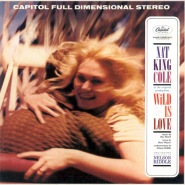A Pile o' Cole's Nat King Cole Website
Site Menu
Wild Is Love
Recorded 3/1,2&9/60
Nat Cole, Vocals
Nelson Riddle, Arranger
- Introduction
- Wild Is Love
- Hundreds And Thousands Of Girls
- It's A Beautiful Evening
- Tell Her In The Morning
- Are You Disenchanted?
- Pick-Up
- Beggar For The Blues
- World Of No Return
- In Love Again
- Stay With It
- Wouldn't You Know (Her Name Is Mary)
- He Who Hesitates
- Wild Is Love Finale
More ambitiously packaged (and promoted) than the previous effort from Nat and Nelson, this "concept album" marked their last album together.
Tracing a lover's convulted path through bliss, dissilusionment, thrill seeking and appreciation in song and, in more abstract, a set of photo illustrations in its deluxe gatefold packaging, Wild Is Love is about as much of a multimedia concept album as had ever been before its 1960 release. The songs, all by the same writers, vary in strength, with Nelson's resourceful orchestration and Nat's vocals remaining the main dish.
Being in the "frame of mind" of the time may be more important to enjoying Wild Is Love than perhaps any other Nat vocal-era album. There's little question it's from/to the perspective of a 1959/1960 "average guy" (and given the date, it'd be more than surprising if it wasn't).
That perspective informs a lot but the most glaring example is Pick-Up. There's one Nat song that few like, but it's worth noting you're not supposed to. How many other Nat songs can that be said about?
"Hey baby, can I give you a ride?"
Nudge nudge, or more like shove shove. The whole business of Pick-Up is supposed to leave a hint of a bad taste (to be at all socially acceptable at the time) and it's put in a way that would have been clearest at the time, but can sound, well, a bit too bald in the era where we might hear pretty much anything described and/or bragged on in detail. That's now though. Having Nat singing of a guy feeling "compelled" to hit the streets at night and proposition a pick-up (er, hooker - "you make the deals" etc) was far from playing it safe for a mainstream popular album in 1960.
To be sure it works best when it's more in tune to Nat's forte. Most are effective at what they're aiming for. Wild Is Love has a certain champaign (or ginger ale at least) bubble with a wild streak provided by the arrangement, which is relatively eccentric and depends (wisely) on Nat as its center; Nat, although suitably lively here, provides the stability of insight and capability both musically and in terms of the lyric. It's A Beautiful Evening is just what it says and no one beats Nat at this direct, non-ironic expression. Tell Me In the Morning could nearly have been on St. Louis Blues. I like how we seem to go from walking aimlessly with him to something akin to a sweeping reverse zoom of him standing with hands up, incredulous at being tested "the day after."
There are a few albums from this era in which Nelson seems to be playing it rather tame, likely in part thanks to his schedule. Not so here. The strings and chimes in Are You Disenchanted are a welcome feel that evoke Nat's earlier "mystery" songs. There's touches like the flat "off" plunking of the piano at points (as an unsavory note) in Pick-Up. Both bass and tuba (the latter played by former Trio bassist Red Callender) have some nice touches in Wild Is Love and Beggar For The Blues. To my ears the vocal chorus is not so successful, but then I'm not a fan of vocal choruses as a rule.
The fact that Nat was so willing to put so much on new songs instead of already proven standards is something I find commendable. Was it misplaced? Unfortunately it doesn't quite gell as well as it seems to strive for and I'd say the songs are the weakest link. A good listen while it's on but after not hearing it a while I can't recall much. It's hard to speculate as to its commercial success, or lack thereof, when odds were becoming steep against any classic pop record by 1960.
Most of classic pop would continue gravitating toward the '70s style MOR it generally solidified into by the late '60s but as far as he was able to go in the '60s, Nat was trying to keep a spark lit in his way, another thing that I think he deserves a lot more credit for than he's often been given. With Wild Is Love Nat & Co tried to make a "special" show of it - fresh songs arranged and performed by top talent as the basis of a themed, colorful production that could lend itself to multimedia (on record, screen and on the road) - to stand out. Although hopes might have been higher, it probably did as well as possible at the time.
